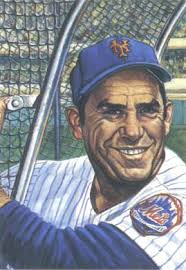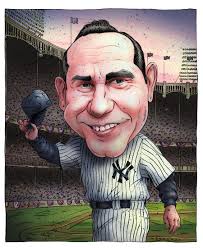(Please see a special editor's note at the end of this piece)
A new American League manager in the 1950s had opportunity to chat with legendary New York Yankees skipper Casey Stengel and ask him what was necessary to put together a great starting lineup. Stengel's reply: "I never play without my man." After musing about that cryptic statement for a while the new manager realized that Casey's lineup always included Yogi Berra.
Perhaps the greatest catcher in major league history, Lawrence Peter Berra died September 22 at age 90, exactly sixty-nine years to the day he made his debut with the Yankees. Though a three time American League Most Valuable Player, Yogi played often during his career in the shadow of other pinstripe greats such as Joe DiMaggio, Whitey Ford, Mickey Mantle and Phil Rizzuto (with whom Berra was once a business partner in a bowling alley).
Yogi Berra was considered by many the most dangerous hitter on the Yankees. Brooklyn Dodger pitcher Joe Black, who faced the Yankees in the World Series, stated he preferred facing Mantle instead of Berra in a pressure situation. Reason? Yogi was known as a "bad ball" hitter, going after that which lingered close inside or way outside the strike zone. When asked his approach to such pitches Berra replied: "To me they looked good."
The highlight of Yogi Berra's catching career was handing the only perfect game in World Series history hurled in 1956 by Don Larsen. The sight of Berra jumping into Larsen's arms after the final strikeout is an indelible image of baseball in the 1950s. Fast forward nearly forty-three years later. On July 18, 1999, "Yogi Berra Day" was held at Yankee Stadium with Larsen and Berra reuniting to throw out the first pitch of that day's game. Yankee hurler David Cone then proceeded to produce a perfect game against the Montreal Expos. To this day, diehard fans of the Yankees are convinced Yogi had "blessed" the ball."


Berra played on fourteen pennant winning teams and ten World Champions. As a manager (Yankees in 1963, Mets in the "You Gotta Believe" season of 1973) he won pennants in both leagues. Elected in 1972 to the Baseball Hall of Fame, Yogi began his acceptance speech in classic fashion: "First, I would like to thank everybody who made this day necessary."
Once upon a time many of the best baseball players in America were also the sport's good will ambassadors. As a player, coach, manager and citizen few fit the bill better than Yogi Berra.
Merrick Library salutes his memory and offers the following books about both Yogi and the Yankees:
Berra, Yogi. When You Come to a Fork in the Road, Take It!: inspiration and Wisdom From One of Baseball's Greatest Heroes
Berra, Yogi. Yogi: It Ain't Over.
Ford, Whitey. Few and Chosen: Defining Yankee Greatness Across the Eras.
Murcer, Bobby.Yankee for Life: My 40-Year Journey in Pinstripes.
New York Times. Sultans of Swat: The Four Great Sluggers of the New York Yankees. (Yogi Berra wrote the introduction to this history)
Paper, Lewis J. Perfect: Don Larsen's Miraculous World Series Game and the Men Who Made It Happen.
Posada, Jorge. The Journey Home: My Life in Pinstripes. (Posada was mentored by Berra)'
Stout, Glenn. Yankees Century: 100 Years of New York Yankees Baseball.
Thorn, John. The Glory Days: New York Baseball 1947-1957.
This post was written by Bob Ludemann a librarian extraordinaire during his 30 year tenure at the Merrick Library. Bob retired this week and while we were sad to see him go, this Blog rues the day even more. Bob's tribute posts have been true gems and I can hardly think of anyone else who could offer such flair, style and grace to the subject at hand.
All the best Bob--we thank you so very much.